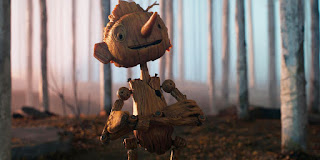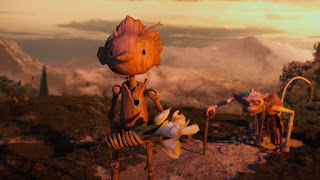Sometimes it takes a gifted filmmaker with a sweeping vision and visual flare to bring a classic story that's already been told before to the screen and reimagine it in a form, which not only honors the previous work but expands on it. With Pinocchio, the classic Disney tale has experienced numerous retellings with the latest effort helmed by Forrest Gump director Robert Zemeckis being a mildly serviceable effort. While that film did nothing to dishonor the originals work, it also didn't do anything innovative with the story and ultimately felt like a lackluster imitation. Thankfully, visionary filmmaker Guillermo Del Toro delivers an immersive experience that wholeheartedly embraces its source material.
Del Toro's Pinocchio remains virtually the same as the classic Disney version storywise with a fathers dearest wish for a real child resulting in him creating a wooden boy and magically bringing him to life. After losing his real son during a bombing raid, the wooden child named Pinocchio gives his father Geopetto, a second chance at being a parent. Whereas the story of Pinocchio is widely-known to most audiences, it's how Guillermo reimagines it that makes it feel fresh and emotionally absorbing. Rather than making it feel like a heartless retelling that lacks soul, Del Toro finds a unique way to reinvent the story of Pinocchio in a form that stays true to the originals spirit while delivering fully on the promise of being a visually captivating experience that's nothing less than a sincere labor of love for the classic Disney tale.
When it comes to voice acting, Pinocchio's cast does a killer job of playing their characters while injecting tremendous amounts of heart to the story. Gregory Mann does a phenomenal job of playing the exuberant and rowdy living wooden puppet, along with playing Geppetto's deceased son Carlo. Mann inserts much energy and emotion into his performance with the audience finding themselves completely caring about both characters he plays. Ewan McGregor is also tremendous as Sebastian, a traveling cricket and the stories narrator, who lives inside Pinocchio both as his guidance and conscience. When Mann isn't the central focus of the story, McGregor picks things up and carries it with his classy performance. David Bradley makes for a fantastic Geppetto with his version of Pinocchio's father being a more heartbroken one than what's generally portrayed in other retellings of the classic tale. The audience truly feels his character's pain of suddenly losing Carlo, as well as wanting a new son with Pinocchio. The rest of the cast shine with noteworthy performances including the talents of Christoph Waltz as ambitious ringmaster Count Volpe, Tilda Swinton as wise magical fairy The Wood Sprite, who gives Pinocchio to life, Ron Perlman as the Podesta, a fascist government official and father of Candlewick who aspires to turn Pinocchio into a soldier with Finn Wolfhard providing the voice as candlewick, and Cate Blanchett as Count Volpe's mistreated monkey assistant, Spazzatura. As far as voice casts go, Pinocchio's is nothing short of remarkable.
In terms of the films animation and overall design, Del Toro brilliantly displays his skillfulness as a visual and magical storyteller with him cleverly utilizing stop-motion effects in presenting a fascist italy-set rendition in animated form. The film contains breathtaking visual imagery that includes Pinocchio's beautiful Italian village, which looks impressively realistic. As for the latter's overall look, Pinocchio is cleverly designed to look like wood that was never completed. Along with co-director Mark Gustafson, both men create an enchanting world for the current reimagining of Pinocchio that's not only fascinating but completely engulfs the audience with them not just taking in the vivid details of the puppets and settings, but also find themselves wondering "How the hell did they do that?" The soundtrack by Alexandre Desplat enhances the stories emotional core with notable key songs performed by members of the cast including "Everything Is New To Me," that's performed by lead actor Gregory Mann or "Cio Papa". With Pinocchio, both Del Toro and Gustafson pour their hearts and talents as filmmakers into this film and deliver a reimagining that's near flawless.
With Pinocchio's writing, the script takes a more mature and darker approach in retelling the classic Disney tale with a heavy emphasis placed on themes pertaining to grieving, loss, pain, and the desire for acceptance with Pinocchio wanting to be looked upon as a real son to Geppetto and not simply a burden. The screenplay also incorporates elements of Italy's previous history into the background such as setting the story around the fascist regime of totalitarian dictator, Benito Mussolini, as evidenced with characters giving the Nazi salute. At the core of Pinocchio's story, Del Toro emphasizes how precious life is with how it can be so brief while showing the great pains that come with it. Examples are Geppetto's character being shown to drink as a way of handling the pain of losing Carlo along with wanting Pinocchio to be exactly the same but realizing that they're both special in their own ways. Del Toro's version also keeps in line with the original films life lessons regarding mortality with Pinocchio wanting to become a real boy to make his father happy, as well as learning about the consequences of his actions through simple things like telling a lie, being obedient, and the belief that what counts in life is not the material that constitutes as being one's body but ultimately what's in the heart.
Del Toro's version of Pinocchio works magnificently well because it takes all of the essential themes and life lessons that the original Disney film explored and reapplies them while adding more depth to the story. Though powerful and hard-hitting at times with its handling of key themes pertaining to loss and grief, Del Toro's Pinocchio never shies away from the dark aspects of its story, but embraces them along with the brighter aspects of Pinocchio's tale. His reimagining is a prime example of how to do it properly and make it feel relevant again.
Final Verdict: SEE IT
Images Courtesy Of Netflix
.jpg)
.jpeg)



.jpeg)



.png)




No comments:
Post a Comment